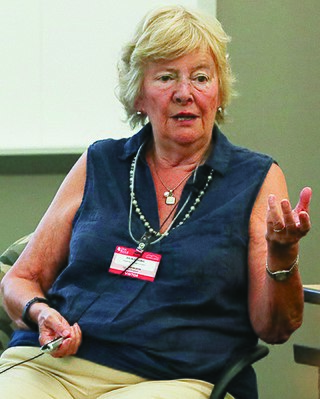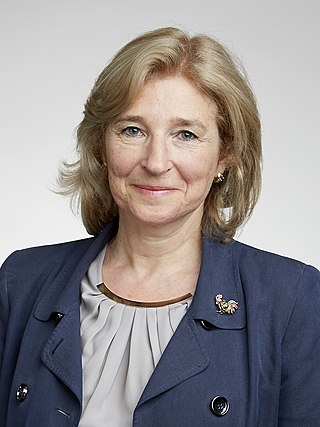Related Research Articles

Dame Julia Stretton Higgins is a British polymer scientist. Since 1976, she has been based at the Department of Chemical Engineering at Imperial College London, where she is emeritus professor and senior research investigator.
Ursula Hilda Mary Martin is a British computer scientist, with research interests in theoretical computer science and formal methods. She is also known for her activities aimed at encouraging women in the fields of computing and mathematics. Since 2019, she has served as a professor at the School of Informatics, University of Edinburgh.
Dame Lynn Faith Gladden is the Shell Professor of Chemical Engineering at the University of Cambridge. She served as Pro-vice-chancellor for research from 2010 to 2016.
Derek John Fray is a British material scientist, and professor at the University of Cambridge.

Dame Molly Morag Stevens is the John Black Professor of Bionanoscience at the University of Oxford's Department of Physiology, Anatomy & Genetics. She is Deputy Director of the Kavli Institute for Nanoscience Discovery and a member of the Department for Engineering Science and the Institute for Biomedical Engineering.

James Henderson Naismith is a Scot, Professor of Structural Biology and since autumn of 2023 the Head of the Mathematical, Physical, and Life Science Division (MPLS) Division at the University of Oxford. He was the inaugural Director of the Rosalind Franklin Institute and Director of the Research Complex at Harwell. He previously served as Bishop Wardlaw Professor of Chemical Biology at the University of St Andrews. He was a member of Council of the Royal Society (2021-2022). He is also currently the Vice-Chair of Council of the European X-ray Free Electron Laser and Vice-President (non-clinical) of The Academy of Medical Sciences.

Benjamin Guy Davis is a British chemist who is Professor of Chemical biology in the Department of Pharmacology and a member of the Faculty in the Department of Chemistry at the University of Oxford and a Fellow of Pembroke College, Oxford. He holds the role of Science Director for Next Generation Chemistry (2019-2024) and Deputy Director (2020-) at the Rosalind Franklin Institute.
Philippa Anne Gardner is a British computer scientist and academic. She has been Professor of Theoretical Computer Science at the Department of Computing, Imperial College London since 2009. She was director of the Research Institute in Automated Program Analysis and Verification between 2013 and 2016. In 2020 Gardner was elected a Fellow of the Royal Academy of Engineering.

The Department of Chemical Engineering, Imperial College London is the centre of teaching and research in chemical and process engineering at Imperial College London, occupying the Aeronautics and Chemical Engineering Extension (ACEX), Bone and Roderic Hill buildings, on the South Kensington campus. Formally inaugurated in 1912, the department has over 40 faculty members, 100 postdoctoral researchers, 200 PhD researchers, 80 taught postgraduates, and 500 undergraduates. The department ranks 7th on QS's 2018 world rankings.

Polina Leopoldovna Bayvel is a British engineer and academic. She is currently Professor of Optical Communications & Networks in the Department of Electronic and Electrical Engineering at University College London. She has made major contributions to the investigation and design of high-bandwidth multiwavelength optical networking.

Anne Neville was the Royal Academy of Engineering Chair in emerging technologies and Professor of Tribology and Surface Engineering at the University of Leeds.

Ruth Misener is a professor at the Department of Computing, Imperial College London. Her research concentrates on the development of software and optimisation algorithms for energy efficient engineering and biomedical systems.

Mary Patricia Ryan is a Professor of Materials Science at Imperial College London and a Fellow of the Royal Academy of Engineering.

Magdalena (Magda) Titirici is a Professor of Sustainable Energy Materials at Imperial College London.
John Douglas Perkins is a retired academic, engineering scientist, and government adviser. He held professorships at Imperial College London and the University of Sydney, served as President of the Institution of Chemical Engineers and was Chief Scientific Adviser to the Department for Business, Innovation and Skills.
Heather A. Harrington is an applied mathematician interested in applied algebra and geometry, dynamical systems, chemical reaction network theory, topological data analysis, and systems biology. Since 2020, she is professor of mathematics and Royal Society University Research Fellow at the Mathematical Institute, University of Oxford, where she heads the Algebraic Systems Biology group. In 2023, she became a director at the Max Planck Institute of Molecular Cell Biology and Genetics, where she is also leading the interinstitutional Center for Systems Biology Dresden (CSBD) together with partners from the Technical University Dresden and the Max Planck Institute for the Physics of Complex Systems.
Elaine Barbara Martin is a chemical engineer and statistician and Head of School at the University of Leeds. She is a Fellow of the Institution of Chemical Engineers, Royal Statistical Society and Royal Academy of Engineering.

Natalie Stingelin, Fellow of the Materials Research Society and Royal Society of Chemistry, is a materials scientist and current chair of the School of Materials Science and Engineering at the Georgia Institute of Technology, the University of Bordeaux and Imperial College. She led the European Commission Marie Curie INFORM network and is Editor-in-Chief of the Journal of Materials Chemistry C and Materials Advances.
Nora Henriette de Leeuw is the inaugural executive dean of the Faculty of Engineering and Physical Sciences at University of Leeds. Her research field is computational chemistry and investigates biomaterials, sustainable energy, and carbon capture and storage.
Amparo Galindo is a Spanish chemist who is Professor of Chemical Engineering at Imperial College London. She is the co-director of the Institute for Molecular Science and Engineering. Her research considers the development of statistical mechanics and simulations to understand industrial processes. She was awarded the 2023 Institution of Chemical Engineers Guggenheim Medal.
References
- ↑ "Honours and Memberships - Prof Claire S. Adjiman FREng". www.imperial.ac.uk. Retrieved 12 June 2023.
- ↑ "Claire Adjiman". www.aiche.org. 20 July 2021. Retrieved 12 June 2023.
- ↑ "Teaching center, awards ceremony". Princeton Alumni Weekly. Vol. 98. 1997. Retrieved 24 June 2020.
- 1 2 "CASL Home Page - C. A. Floudas - Process Synthesis; ProcessControl; Mixed-Integer Nonlinear and Global Optimization; Computational Chemistry". titan.princeton.edu. Retrieved 2 December 2019.
- 1 2 3 4 5 6 7 "Home - Prof Claire S. Adjiman FREng". imperial.ac.uk. Retrieved 13 April 2018.
- ↑ Imperial College London (1 July 2013), Molecules on best behaviour: The engineering of molecular systems , retrieved 13 April 2018
- 1 2 "Claire Adjiman - EPSRC website". epsrc.ukri.org. Retrieved 13 April 2018.
- ↑ "Claire Adjiman's Inaugural Lecture Now Available Online | Imperial News | Imperial College London". Imperial News. Retrieved 13 April 2018.
- ↑ "C. Adjiman". www.journals.elsevier.com. Retrieved 13 April 2018.
- 1 2 "Management Team". Imperial College London. Retrieved 13 April 2018.
- ↑ "Professor Claire Adjiman FREng". Royal Academy of Engineering. Retrieved 13 April 2018.
- ↑ "World-leading engineers elected to Academy Fellowship". Archived from the original on 26 July 2017. Retrieved 3 June 2020.
- ↑ "Honours and Memberships - Prof Claire S. Adjiman FREng". www.imperial.ac.uk. Retrieved 12 June 2023.
- ↑ Webpage of Claire Adjiman in the National Academy of Engineering} | url=https://www.nae.edu/19579/19581/20412/290774/Professor-Claire-S-Adjiman
- ↑ "Molecular Systems & Design Engineering (Royal Society of Chemistry)". www.rsc.org. 23 February 2016. Retrieved 13 April 2018.
- 1 2 "Honours and Memberships - Prof Claire S. Adjiman FREng". www.imperial.ac.uk. Retrieved 2 December 2019.
- ↑ "Philip Leverhulme Prize Winners 2009" (PDF). The Leverhulme Trust. Archived from the original (PDF) on 15 February 2018. Retrieved 13 April 2018.
- ↑ "Honours and Memberships - Prof Claire S. Adjiman FREng". www.imperial.ac.uk. Retrieved 13 April 2018.
- ↑ "Claire Adjiman presents the Henry Armstrong Lecture" . Retrieved 13 April 2018.